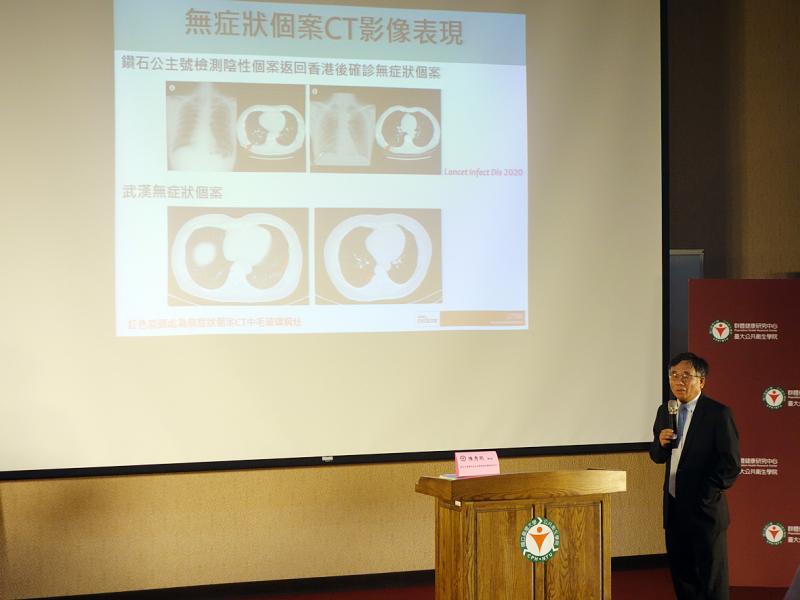A Belgian man who tested positive for COVID-19 in Taiwan last week is likely to have contracted the disease in Taipei in late June, National Taiwan University (NTU) College of Public Health vice dean Tony Chen (陳秀熙) said yesterday.
The Central Epidemic Command Center (CECC) on Saturday reported that the man, who is in his 20s, came to Taiwan for work on May 3 and tested positive on Wednesday last week as he was about to depart.
The man in March reported loss of taste and smell, the center said, adding that he worked in Changhua County, but visited Taipei several times, and traveled to Yilan County and Taichung this month.

Photo: Wu Po-hsuan, Taipei Times
Although the center has not listed the case as imported or locally acquired, health experts have said that the man might have contracted the disease in Taiwan.
There are four possible scenarios for how the man was infected: He contracted it in Belgium, he had close contact with an infected traveler on his way to Taiwan, he was exposed to an infected person in a local community, or he contracted the disease twice — in Belgium and in Taiwan, Chen said.
Among the four scenarios, contracting the disease in Belgium or being infected twice are the least likely, he said.
The viral load should have significantly reduced after so many weeks if he was infected in Belgium, while genome sequencing of the virus would need to be conducted to determine if he contracted it twice, Chen said.
Based on the cycle threshold value of a real-time reverse transcription-polymerase chain reaction test that the man had, he might have been exposed to COVID-19 from June 20 to 26, which includes time that he was in Taipei, Chen said.
“It is impossible that Taiwan has no domestic cases,” he said. “We are only testing people who have symptoms, so we might miss a few asymptomatic cases.”
Tests conducted among people onboard the Diamond Princess cruise ship, a long-term care facility and in some US states show that the incidence rate of asymptomatic or pre-symptomatic cases could be as high as 60 percent, he said.
People who are asymptomatic or pre-symptomatic might be infectious, although less so than people with symptoms, he said.
While most people in Taiwan who might have had COVID-19, but were asymptomatic, should have recovered by now, three cases — the Belgian, a Japanese student and a Thai migrant worker, who tested positive for the coronavirus before or upon returning to their native country — show that local infections are possible, Chen said.
The three cases might have had low viral loads, so people would have had to have an extended time of close contact with them for the disease to be transmitted, he said, adding that so far contacts of the cases have all tested negative for the disease.
Risk stratification and precise testing should be conducted, especially among six groups at higher risk of infection from an asymptomatic cases, he said.
The groups are: people in healthcare facilities, people in long-term care centers, cruise ship passengers, migrant workers, people at workplaces or other places that they share with foreign nationals, and people in other situations where they have close contact with others for extended periods, he said.
People should keep social distancing, wearing a mask and washing their hands frequently, he said.

The manufacture of the remaining 28 M1A2T Abrams tanks Taiwan purchased from the US has recently been completed, and they are expected to be delivered within the next one to two months, a source said yesterday. The Ministry of National Defense is arranging cargo ships to transport the tanks to Taiwan as soon as possible, said the source, who is familiar with the matter. The estimated arrival time ranges from late this month to early next month, the source said. The 28 Abrams tanks make up the third and final batch of a total of 108 tanks, valued at about NT$40.5 billion

Two Taiwanese prosecutors were questioned by Chinese security personnel at their hotel during a trip to China’s Henan Province this month, the Mainland Affairs Council (MAC) said yesterday. The officers had personal information on the prosecutors, including “when they were assigned to their posts, their work locations and job titles,” MAC Deputy Minister and spokesman Liang Wen-chieh (梁文傑) said. On top of asking about their agencies and positions, the officers also questioned the prosecutors about the Cross-Strait Joint Crime-Fighting and Judicial Mutual Assistance Agreement, a pact that serves as the framework for Taiwan-China cooperation on combating crime and providing judicial assistance, Liang

A group from the Taiwanese Designers in Australia association yesterday represented Taiwan at the Midsumma Pride March in Melbourne. The march, held in the St. Kilda suburb, is the city’s largest LGBTQIA+ parade and the flagship event of the annual Midsumma Festival. It attracted more than 45,000 spectators who supported the 400 groups and 10,000 marchers that participated this year, the association said. Taiwanese Designers said they organized a team to march for Taiwan this year, joining politicians, government agencies, professionals and community organizations in showing support for LGBTQIA+ people and diverse communities. As the first country in Asia to legalize same-sex

MOTIVES QUESTIONED The PLA considers Xi’s policies toward Taiwan to be driven by personal considerations rather than military assessment, the Epoch Times reports Chinese President Xi Jinping’s (習近平) latest purge of the Chinese People’s Liberation Army (PLA) leadership might have been prompted by the military’s opposition to plans of invading Taiwan, the Epoch Times said. The Chinese military opposes waging war against Taiwan by a large consensus, putting it at odds with Xi’s vision, the Falun Gong-affiliated daily said in a report on Thursday, citing anonymous sources with insight into the PLA’s inner workings. The opposition is not the opinion of a few generals, but a widely shared view among the PLA cadre, the Epoch Times cited them as saying. “Chinese forces know full well that